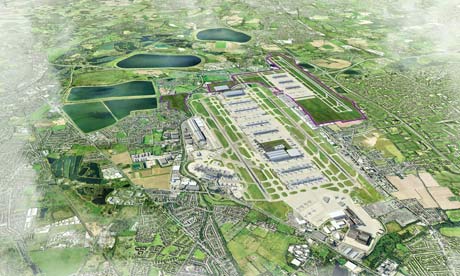
This week has been an apt reminder that George Orwell's dismissive name for the England of 1984 was Airstrip One. Except where the venerable gloom-monger was referring to America's pernicious influence, the past few days have given another meaning to the term, by underlining the strength of the aviation lobby. The week began with the mayor of London, Boris Johnson, setting out his plans for a giant new airport on Kent's Isle of Grain. Yesterday saw the comeback from the consortium running Heathrow airport: three options for a third runway, to be built by the end of the next decade.
Two very different blueprints for the future of Britain's transport network and its economy, but with one tarmac-coated common assumption: that the future inevitably lies in building more airport capacity at the cost of many billions and allowing tens of thousands more flights – at ruinous cost to the environment.
Just what does ruinous mean? Start with the local costs. The easiest, quickest option from Heathrow, building north, would mean demolishing the villages of Sipson, Harlington and Cranford Cross and displacing 2,700 households. The least invasive plan would still destroy part of a reservoir, a village and would involve building over the M25.
Full credit to Sir Howard Davies and his fellow airports commissioners for calling all submissions in so early – because they have effectively forced the aviation lobby to show their hands and give all-too-concrete detail about the costs of their schemes. After the Heathrow expansion plans were canned in 2010, an entire industry began a well-resourced campaign in talking up the need for a hub and how London risked losing out to Paris and Amsterdam. Such rhetoric sounded persuasive in the abstract, but many Londoners (and non-Londoners) will find the specifics hard to stomach.
Before putting this debate into a wider context, it is worth remembering a few specifics. First, Heathrow remains the busiest airport in Europe. Second, projections of demand are often wrong. As the National Audit Office observed last year, Britain's first high-speed rail line was built on "hugely optimistic" forecasts for demand that never materialised.
Finally and perhaps most importantly, controlling the growth of aviation will be crucial to ensuring Britain meets its carbon emissions targets and therefore plays its part in averting climate catastrophe. It is hard to imagine how the UK will cut greenhouse gases by 80% by 2050 if it is building a third, a fourth (as suggested by Heathrow yesterday) and perhaps even preparing a fifth runway in a corner of west London. Expanding airports in the south-east risks locking Britain into a climate-destroying and regionally unbalanced future. No amount of lobbying should distract us from that.
YOUR COMMENT